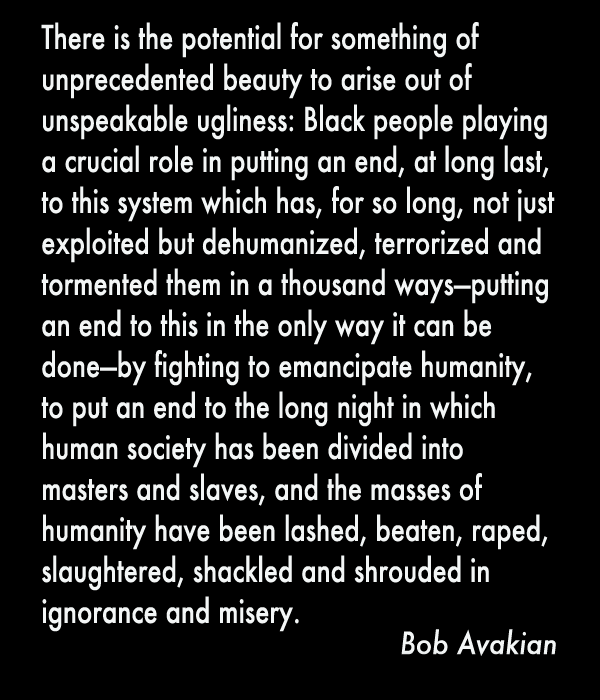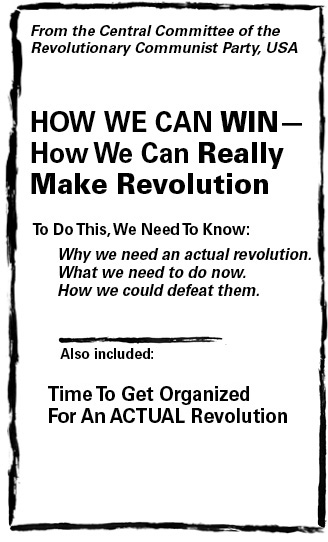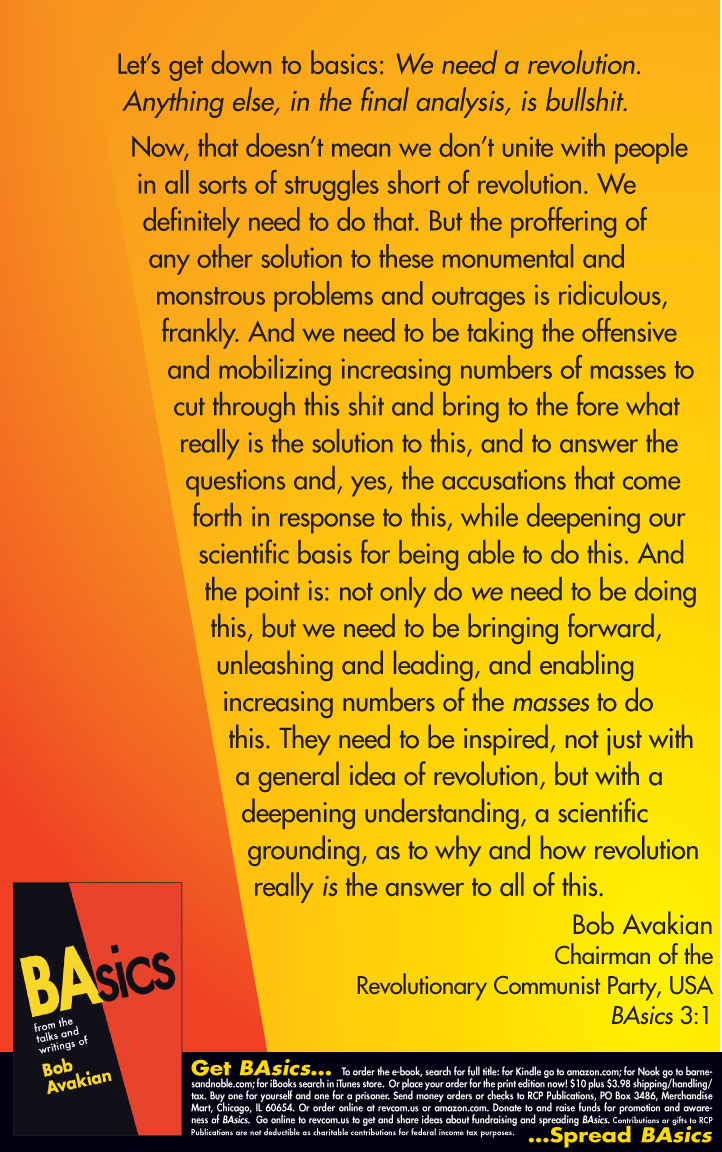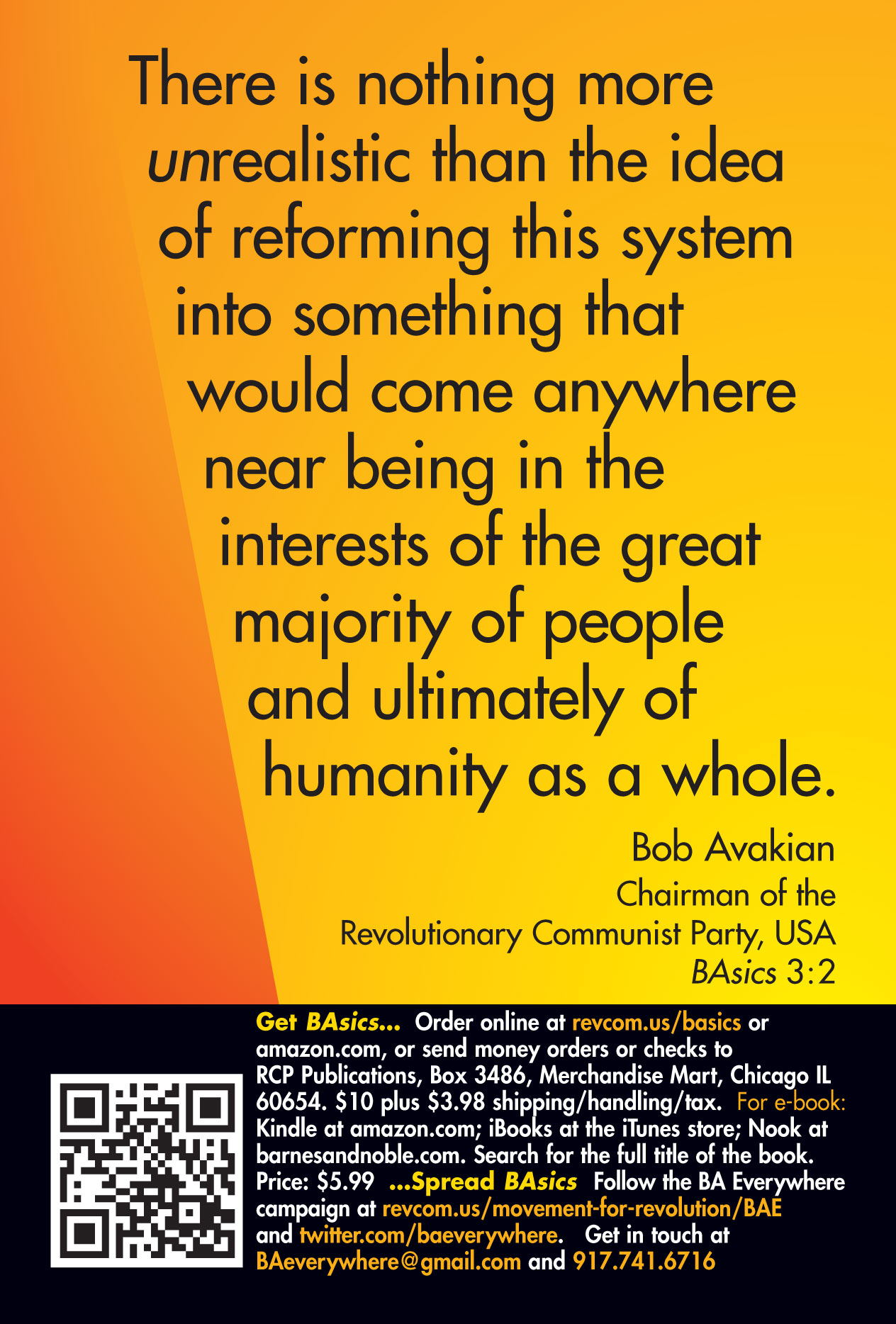Revolution Books Salon:
What It Would Take to End This Country's Savage Oppression of Black People
| Revolution Newspaper | revcom.us
From a reader:
Nearly 30 people came together at Revolution Books in Harlem the other night to participate in a salon led by Carl Dix that focused around Bob Avakian’s powerful quote:

We began by watching “They’re Selling Postcards of the Hanging,” BA’s searing indictment of this system and a powerful illustration of the quote itself. Then Carl read the quote and posed the question: “Is it true? Would it really take an actual revolution aiming to emancipate humanity to end the savage oppression this country has enforced on Black people? And is it asking too much of Black people to say they should be among those in the front ranks of the fight to emancipate humanity?”
The discussion that followed was substantive, serious, and lively—people getting down on real questions in a serious encounter. Carl would step in every so often to respond to things on the floor, pose questions or reframe the terms, but this was a crowd that was mainly staying on point and had a lot on their minds that they wanted to speak on. I was struck by how much those who were answering Carl’s first question in the affirmative were also saying that no, it was not too much, it was necessary—with a younger Black woman emphasizing that there needed to be people of all nationalities in the revolution. At one point, someone spoke briefly to cite the following from HOW WE CAN WIN—How We Can Really Make Revolution in a way that got at some of what was being “reached for” in the discussion:
To make this revolution, we need to be serious, and scientific. We need to take into account the actual strengths of this system, but more than that its strategic weaknesses, based in its deep and defining contradictions. We need to build this revolution among those who most desperately need a radical change, but among others as well who refuse to live in a world where this system spews forth endless horrors, and this is continually “justified” and even glorified as “greatness.”
This short quote hit with powerful effect. Every sentence spoke in some way to something that was either on the floor or just beneath the surface of the conversation.
The turnout was not the result of some major effort. According to Raymond Lotta of Revolution Books, efforts to build this were done through RB email and social media; announcements and publicity at the store, including people who had seen the BA quote up on the chalkboard that day and were intrigued; and other types of outreach that have been going on. The point is, this was not a major effort, built for weeks with mass leafleting, postering, and other forms. Such major efforts are, to be clear, sometimes critically important; but this indicates the basis to also do simpler things that do not have to be “major productions.”
I myself got into discussion afterward with a very serious young man who felt that he had really found something he had been looking for here, purchasing BAsics and making a donation. He was brought there by a friend who worked in the neighborhood (a number of people came in groups or were couples); and with an older guy who had been on the “outskirts,” as he put it, of SDS in the 1960s but hadn’t done much since—he said that he wakes up every morning infuriated about things and had run into the movement at Union Square, when Refuse Fascism had needed someone to help hold their banner at an anti-Trump demonstration a few nights earlier. All told, again according to Lotta, perhaps 20 of the people there were new to store programs.
Without developing some grand hypothesis, I think you could say that the turnout and content of the discussion here indicated an opening that we should be striving to seize in as many ways as we can. The salon described above can not only be replicated elsewhere at other centers or bookstores, it can be repeated, either around the same quote or different ones (BAsics 3:1 and 3:2—focusing on revolution vs. reform—come to mind).
I would also say that playing the full “Postcards of the Hanging” was an excellent introduction to the person who is the architect of the new communism and the leader of the revolution. Especially given the number of newer people there, but not only for that reason, it’s important to let people know about this leader and to give them a feel for who he is. We should be encouraging people to get the biography and reprints of “Watching Fruitvale Station with Bob Avakian” so they can find out more.
It was good to wield HOW WE CAN WIN in the discussion; this added clarity at a certain point. In my view, it might have been good to have ended the salon a little earlier so that there could have been more time for both informal mingling and to directly organize those who were interested in fighting into the movement for revolution. To be clear—and this is important—not everyone there wanted to be organized; some people just wanted the chance to participate in a discussion of the questions addressed in BA’s quote, and it’s real important that there be space for that and that these salons not be reduced to organizing sessions. At the same time, there were also people there who did want to find a way to act. Plus, this was an evening salon, and people were there who had not yet eaten dinner or who had to wake up early the next day. But again—overall a very good thing and something we need much more of.
“They're selling postcards of the hanging.” – clip from Revolution: Why It's Necessary, Why It's Possible, What It's All About, a film of a talk by Bob Avakian given in 2003
Get a free email subscription to revcom.us:

Volunteers Needed... for revcom.us and Revolution
If you like this article, subscribe, donate to and sustain Revolution newspaper.




